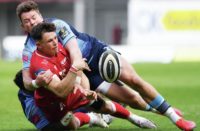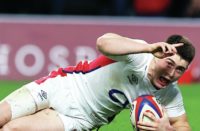
On the back of a fine showing in the World Cup their consistency away from home in alien conditions keeps the pressure up on World Rugby to start getting tough with the Six Nations committee.
The world governing body is mandated to grow the game, not protect cabals, and many are now seriously asking why some kind of promotion and relegation still doesn’t exist in what should be a merit-based competition between Europe’s finest teams, rather than a self-perpetuating elite.
Those politics will intensify but in the meantime their climb up the world rankings was recognised when their coach, New Zealander Milton Haig, right, was honoured with the nation’s highest sporting award – the ‘cavalier of sports of Georgia medal’ – for his work with the team since he joined in 2011.
Others to receive the award include Georgia’s five-time world chess champion Nona Gaprinda-shvili and three-time Olympic medallist shooter Nino Salukvadze.
“It was a great honour and very much appreciated and it goes without saying that in reality this award goes to everybody who has contributed so massively to Georgian rugby in recent years,” says Haig.
“There is so much energy and commitment here and that comes from all the players and everybody concerned with Georgian rugby. Everybody is working flat out in the right direction. We know it only gets harder from here but we are ready for what lies ahead.”
Georgia’s tour results are all the more praiseworthy in that they were without a virtually first-choice pack with most of their big names in the T14 play-offs. Davit Ziraka-shvili and Viktor Kolelishvili were required by Clermont while Davit Kubriashvili, Mikheil Nariashvili – voted this week as T14’s best loose- head prop – and Konstantin Mikautadze featured for Montpellier.
Meanwhile, Davit Khinchagishvili was involved for Racing, Vasil Kakovin at Toulouse and a trio of forwards started for Toulon in the T14 final itself in Levan Chilachava, Konstantin Mikautadze and, of course, Mamuka Gorgodze.
Not many sides could easily absorb those losses up front yet such is Georgia’s embarrassment of riches is that they simply rotated two different, if lesser known, prop combinations with no discernible drop of in quality. Irakli Mirtskhulava and Karlen Asieshvili started the Samoa and Fiji Tests and bossed the scrums while Anton Peikrishvili and Zurab Zhvania did likewise in the middle Test against Tonga.
It’s a credit to Georgia that their improved conditioning and defence was the key in all three games. Against Samoa they hit back from 16-9 down with a try from Giorgi Tkhilaishvili to eventually draw 19-19 while, against Tonga, their improved 80-minute fitness saw centre David Kacharava cross for a try, his second, in added time to clinch a famous 23-20 over the team they also beat at Kingsholm in the World Cup.
Finally, the combination of a strong scrummaging and resolute defence not only heralded a 14-3 win over Fiji but, in so doing, Georgia became the first team to prevent the Fijians scoring a try in nearly five years, since they played Wales in the 2011 World Cup.
“The tour to the Pacific was about doing something special, something which no Georgian team had ever undertaken before and it was a big ask,” says Haig.
“We gave our World Cup everything and we knew from the moment the games were organised we’d be missing some of the more experienced guys but it was an opportunity we just could not turn down. Somehow we had to regain that intensity from the World Cup straight away because it is a very tough place to tour.
“We knew the heat would be an issue and we prepared as well as we could for that and got down to Apia a long way ahead of the first game against Samoa to acclimatise and it paid off with our draw. The tour gathered real momentum after that. It was a great experience, we are spreading our wings a bit.”
Haig will also be pleased, when he gets a chance to review the matches, with Georgia’s display at the Junior World Cup in Manchester where they eventually finished 10th which would have guaranteed a place in next year’s Championships save for the fact they are hosting them and already pre-qualified.
The young Georgians were caught cold first up against New Zealand but made an excellent Ireland side work hard and were absolutely ballpark against Six Nations Grand Slam champions Wales before losing 10-9. They then beat Italy and narrowly lost 27-24 to France in the 9th-10th play-off.
Georgia could, without the batting an eyelid or undue administrative hassle, be included in next year’s Junior Six Nations U20
championships if World Rugby were willing to force the issue or if the will existed within the Six Nations committee to improve their product.
BRENDAN GALLAGHER























